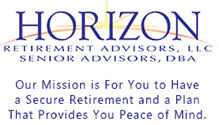Dave Mello
Horizon Retirement Advisors, LLC
Is too much derisking of your retirement fund a good idea?
Is too much "de-risking" a good idea?
"If you are thinking about rolling your 401k into an IRA, you may believe that you should strip all the risk out of your investment matrix by reducing the number of equities in your portfolios. But, is this the optimum strategy in 2021?"
According to research from JP Morgan, a majority of retirees, nearly 75%, reduce their equity exposure after doing 401k rollovers to IRAs. Using required minimum distributions (RMDs) as their central guidance, most retirees don't take distributions before the RMD age of 72 (70 ½ if you reach 70 ½ before January 1, 2020.) Those retirees older than RMD age often take only the required distribution amount.
Understandably, retirees and pre-retirees seek to avoid risk when they no longer receive regular paychecks. After all, the older you get, the more challenging it is to replace money lost in a market downturn. However, having an incorrect amount of equities in your retirement and income portfolio means that you could lose out on the market gains you'll need to design a more secure retirement.
De-risking, especially at the wrong time, could mean that you might miss opportunities to grow your wealth during market upswings and may not have enough money to last your lifetime.
Many retirement and income experts believe that de-risking based on required minimum distributions is inefficient and doesn't create the right amount of income to reflect retirees' spending behavior. Using your RMD as a guide could also have the unintended consequence of causing you to leave too much money in an account when you die.
Instead, say researchers, a goal-based planning approach has a greater chance of success. People tend to do better when they follow financial plans based on their time horizons, risk tolerances, goals, and relationship to money. In theory, this means you and your advisor may need to take on greater risk, which in turn could lead to greater potential returns.
After all, you could theoretically be retired 30 years or longer.
A potentially long, expensive retirement is why you shouldn't leave anything to chance, even if you choose goals-based planning. You and your advisor or advisory team must manage your portfolio proactively. You might consider instruments such as fixed indexed annuities. Fixed indexed annuities can create a stream of guaranteed income, give you some measure of market participation, and are perhaps less risky. Having at least one source of guaranteed income can help you feel less anxiety about your retirement income decisions and make you a little more comfortable with risk.
Summing it up: Pro-active, goals-based planning can be more efficient than using RMDs as guidelines. RMD-based planning is inefficient because it does not solve any specific retirement outcomes you may want. On the other hand, a correctly implemented goals-based approach can align with your values, better reflect your retirement spending behavior, free you up to spend more with less stress, and achieve greater utility of the money you've saved.

Dave Mello
Horizon Retirement Advisors, LLC
707 Mount Rose St.
Reno, Nevada 98509
horizon@retirevillage.com
(775) 851-4754

Looking For Answers?
Download our Safe Money Guide and learn more about safe retirement options that can help you achieve your retirement goals safely - FREE!


